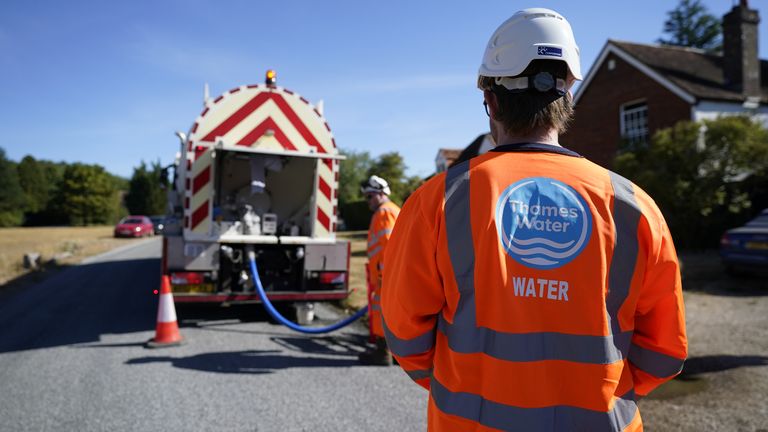Water bills: Thames closer to end game as UK pays high price for failure of industry oversight

Ofwat’s determination that customer bills must rise 21% on average to keep the water industry afloat amounts to an admission of a torrent of failures; of regulation, of foresight, and the management of regional monopolies that at times appear to be competing only to prove that the 35-year privatisation regime has been a mistake.
The fact that bills will increase is not the problem.
It is unrealistic for consumers to expect a complex utility to expand to meet the demands of climate change without its primary customers contributing.
Money latest:
Policy tweak could save you £295 on car insurance
It’s equally delusional however not to expect those customers to complain after decades during which water companies failed to make long-term investments, and the regulator and successive governments conspired in the fiction that everything could be delivered without prices going up.
Just five years ago, at its last price review, Ofwat insisted water companies should cut bills by an average of 13% while spending more than £50bn, arguing that benign interest rates and efficiencies would allow them to deliver on targets including a reduction in pollution of rivers and streams.
Remarkably, the word “sewage” appeared only three times in Ofwat’s 2019 overview and “outflows” not at all, eclipsed by mentions of drought and flooding.
Fast-forward and the world has changed. Sewage outflows have become the centre of public concern, the millions of litres of waste pouring into waterways a metaphor for an industry from which billions has been extracted in dividends and executive bonuses while debt has piled up.
The political salience of sewage made water an election issue in a swathe of formerly solid Conservative seats in the Thames Valley and south of England that elected Liberal Democrats and Labour MPs last week.
The investment climate has been transformed too.
The era of low interest rates and cheap money is long gone too, making it more expensive to borrow and returns less competitive, particularly if investments come with intense political and public scrutiny.
The challenge is most acute to Thames Water, up to its neck in debt, burning through cash and struggling to replace £3.5bn of new equity promised by shareholders who have now declared they are out.
Having warned earlier this week that it will run out of money within a year, it will now go to the markets with the prospect of raising half the customer revenue it says it needs.
Thames wanted to increase bills by 44% and permission to spend a total of £21bn over five years, including operating expenses and investment. Ofwat has met them halfway on bills, allowing a 21% hike, but cut the total expenditure by a quarter to £16.9bn, and offered a damning assessment of the company’s plans.
The regulator judges its proposals to cut leaks and pollution incidents as “inadequate”, has made “significant interventions” in Thames’ business plan as it “did not meet minimum standards” and warned the company faces “deep operational and financial resilience challenges”.
Notably Ofwat suggests one measure Thames could take to restore order would be breaking the company into two entities. Separating the company into London and Thames Valley operations, or into waste and water divisions, has been suggested should the company fall into administration.
Read more:
Thames Water pins survival hopes on Ofwat’s shoulders
Why water firms argue that higher bills are essential
That now looks an increasingly likely end game.
Thames Water is far from alone in having failings. The entire industry has proved far more efficient at removing money from the water system than sewage. But having set itself until the turn of the year to find fresh investment, it is spiralling closer to the plughole.
Britain’s biggest water company is up the proverbial creek and Ofwat may just have removed the paddle.
Related
Why investing in women is a vital next step for…
Get Nadine White's Race Report newsletter for a fresh perspective on the week's newsGet our free newsletter from The Independent's Race CorrespondentGet our fre
Business secretary signals major shift on electric car policy to…
In a determined effort to retain Nissan’s manufacturing presence in Britain, Business Secretary Jonathan Reynolds has vowed to implement “substantial c
Joint Statement: Business Secretary and Fujitsu Services Ltd
Business and Trade Secretary Jonathan Reynolds today (Friday 7 March) met chiefs for Fujitsu in Tokyo to begin talks over the cost of redress for victims of th
UK foreign secretary backs multilateral defence funding for Europe
UK foreign secretary David Lammy has said that a new multilateral fund will be needed to secure Europe’s defence as he confirmed that Britain is “open to”














